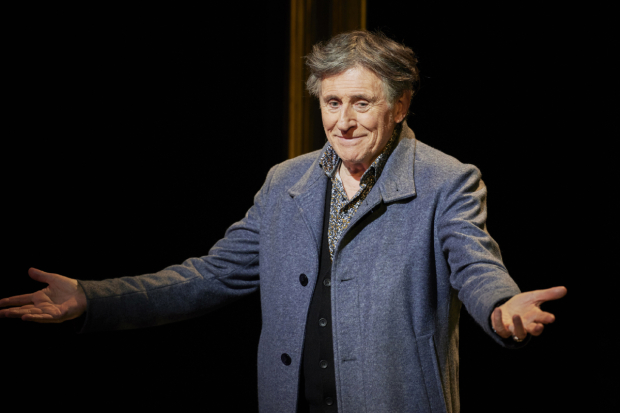”Gabriel Byrne: Walking with Ghosts” at the Apollo Theatre – review

Gabriel Byrne stands in the spotlight. The stage, framed (in Sinead McKenna’s design) by a receding sequence of gold frames, is more or less bare: a desk, a stool, a chair. A trace of mist floats around his feet. But then he begins to talk, filling the space with a shower of words. And what words they are – words that conjure whole worlds inhabited by the “ghost boy” of his impoverished Dublin childhood, and his early life before he became the famous star of films such as The Usual Suspects and the TV series, In Treatment.
The show, which is based on the 72 year-old actor’s autobiography of the same name, is a surprise. It’s not one of those evenings where a star looks back on an anecdote-filled life. Famous names do make an appearance: Byrne meets the writer Brendan Behan, bare-footed and drunk, on the bus as he goes to school for the first time; he encounters Richard Burton in a long, late-night drinking session in Venice.
But the famous are not there to add gloss and entertainment. They appear as part of the tapestry of his life, which he conjures before us with the skill of a master storyteller. And just as important as Burton and Behan, are his mother and father, and the nun who ran his primary school, and the cruel Christian Brother who beat him. All are vividly brought to life with a quick change of intonation and expression.
Sometimes the characters Byrne evokes are comic: the woman with her “new teeth like a row of fridges in her mouth”, the eccentric characters stalking the streets where he lived, the plumber who begs him to take up another career – “you are a dreadful plumber” – the amateur actors, with their elaborate curtain calls, who begin to provide him with a route to personal fulfilment.
But, under the sensitive direction of Lonny Price, the evening also has moments of extraordinary, concentrated stillness and sadness. The long section in which Byrne describes the way he was abused by a priest he liked and trusted at the seminary where he went at 11, is almost unbearable to watch; his words and actions underline the depth and damage of the betrayal. Years later, he tracks him down and rings him in his retirement home. Sitting at the desk, he recounts the conversation. The man does not remember him; all the fury and hurt he feels, ebbs away in the face of a frail voice at the end of a phone.
He is equally honest about his alcoholism, about his sister’s mental illness, about the poverty he grew up amidst and the shame it caused him. Yet Walking with Ghosts isn’t a bleak evening. It feels as if Byrne is gently teasing out the links between the person he once was and the person he has become, understanding his present by his accommodation with the ghosts of his past.
In particular, the show feels like a tribute to his parents, who scrimped and saved to give him the best life they could – and never showed him anything except love. In his gentle memories, they come to vivid and inspiring life, his mother relishing her treat of a tea in posh Dublin hotel, pulling on a cigarette full of longing, his father shocked by the prices when they go out for a celebratory dinner.
You feel the force of their goodness throughout an evening that is beautifully paced and finely judged. Byrne reveals himself as a writer with an eye for detail and the soul of a poet – and as an actor of considerable power and finesse. It’s an understated night of theatre, but a rich one.












